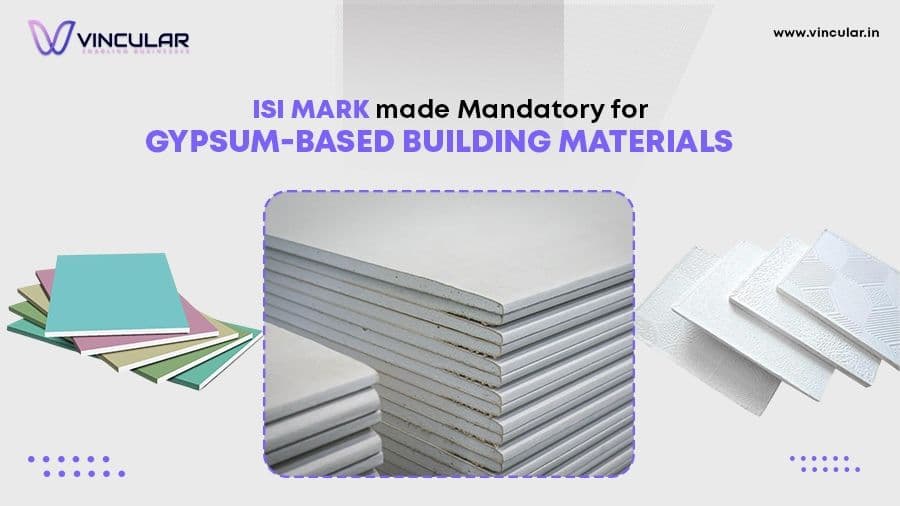
ISI Mark made Mandatory for Gypsum-based Building Materials
Recently, the Department of Commerce and Industry made ISI Mark mandatory for Gypsum-based building materials. A soft mineral, Gypsum is commonly used in building materials because of its durability, versatility, and useful properties. It’s great for making plaster, as it can be shaped into different forms or smoothed out to
Recently, the Department of Commerce and Industry made ISI Mark mandatory for Gypsum-based building materials.
A soft mineral, Gypsum is commonly used in building materials because of its durability, versatility, and useful properties.
It’s great for making plaster, as it can be shaped into different forms or smoothed out to make surfaces.
Gypsum is also used to make plasterboard, known as drywall, which we often use for interior walls and ceilings.
As the demand for gypsum-based materials grows, ensuring quality and safety becomes important for consumers.
To address this, the government introduced a Quality Control Order (QCO) for these materials.
But do you know what ISI Mark, Quality Control Order (QCO) is, why these directives are issued, and so on?
Let’s start by understanding what is the ISI Mark and Quality Control Order.
What is the ISI Mark and Quality Control Order?

The ISI Mark is a scheme established by the Bureau of Indian Standards (BIS) to ensure products adhere to specific quality criteria.
The ISI Mark or we can say the symbol of quality assurance, indicates that the product meets the standards set by the BIS.
Since its inception in 1955, the BIS, India’s premier standards body, has utilized this mark to signify compliance with national quality benchmarks.
In essence, the ISI Mark is a symbol of trust, safety and quality.
Quality Control Order

As part of the Atmanirbhar Bharat Abhiyan, the Indian government has implemented measures to enhance the quality standards of products.
One significant step taken is the introduction of Quality Control Orders (QCOs).
Quality Control Orders (QCOs) are directives issued by various Ministries/Departments of the Government of India.
These orders ensure that products conform to Indian Standards, thus ensuring their quality.
Now, let’s understand the quality control order issued by the government for gypsum-based building materials.
Understanding QCO for Gypsum-Based Building Materials
Recently, the Department of Promotion of Internal Trade (DPIIT) issued a directive named Gypsum-based Building Materials (Quality Control) Order, 2024.
This directive states that gypsum-based building materials need to carry the ISI Mark and must adhere to corresponding Indian Standards mentioned below in the table.
|
Goods or Articles |
Indian Standard |
Title of Indian Standard |
|
Gypsum-based Building Materials
|
2095 (Part 1):2011 |
Gypsum Plaster Boards |
|
17400:2021 |
Gypsum Plaster Boards Glass Fibre Reinforced Gypsum Panels | |
|
2692: 1989 |
Gypsum Plaster Boards – Coated/ Laminated Gypsum Plaster Boards | |
|
2095 (Part 3):2022 |
Gypsum Plaster Boards – Reinforced Gypsum Plaster Boards, Ceiling Tiles |
Moreover, this order will come into effect from September 06, 2024, six months from the date of publication of this notification in the Official Gazette.
Small enterprises have until December 6, 2024, which gives them nine months, to comply with this order.
Whereas, micro-enterprises have until March 6, 2025, giving them twelve months to meet the standards.
To know more you can access the official notification from here.
Why ISI Mark Made Mandatory for Gypsum-Based Building Materials?
The ISI Mark is made mandatory for Gypsum-Based Building Materials to ensure they meet certain quality and safety standards set by the BIS.
This step is taken to:
1. Ensure Quality: The ISI Mark indicates that the product has undergone testing and meets the specified quality standards.
This helps consumers make informed choices and ensures they get reliable and durable materials for construction purposes.
2. Enhance Safety: Gypsum-based building materials play a crucial role in construction, and ensuring their quality is essential for the safety of buildings and occupants.
The ISI Mark serves as a guarantee of safety, assuring consumers that the materials they use adhere to prescribed safety norms.
3. Combat Substandard Products: Mandating the ISI Mark helps in curbing the increase of inferior quality materials in the market.
This regulation prevents the production and sale of low-quality products, thereby safeguarding both consumers and the reputation of the construction industry.
4. Standardization: By adhering to established standards and obtaining the ISI Mark, manufacturers contribute to the standardization of products in the industry.
This facilitates consistency and uniformity in quality across different brands and manufacturers.
How Vincular Can Help You Get ISI Mark?

Vincular is the best regulatory compliance company in India and if you want to achieve ISI certification you can partner with them.
Our team of experienced experts has diverse knowledge of industries and will help you get ISI certification for your product hassle-free.
Note – To keep up with the market and know about the latest regulations and notifications watch our Publication or subscribe to our WhatsApp channel.